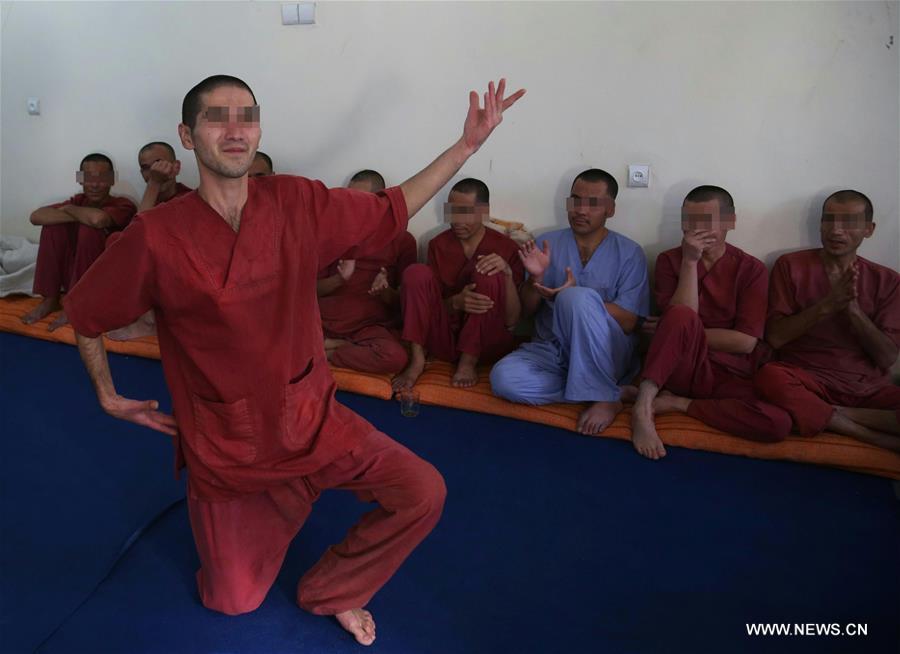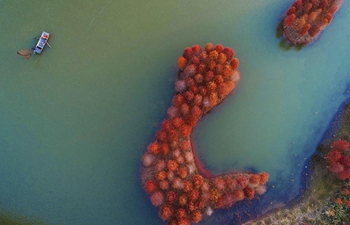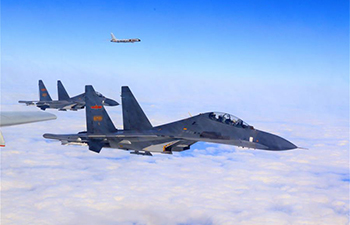
A drug addict dances at a rehabilitation center in western neighborhood of Kabul, Afghanistan, on Nov. 19, 2017. Despite lack of resources, Laila Haidari, a dedicated Afghan woman, has succeeded in running a drug addicts' rehabilitation center for seven years in western neighborhood of Kabul where numerous addicts usually lose their lives in winters. (Xinhua/Rahmat Alizadah)
by Farid Behbud
KABUL, Nov. 28 (Xinhua) -- Despite lack of resources, Laila Haidari, a dedicated Afghan woman, has succeeded in running a drug addicts' rehabilitation center for seven years in western neighborhood of Kabul where numerous addicts usually lose their lives in winters.
"I set up Camp Mother seven years ago and since then, I treated over 4,500 drug addicts out of whom some 1,000 abandoned narcotics and rejoined their families. But unfortunately, the rest failed to quit the drugs," Haidari, an Iranian-born Afghan woman, told Xinhua recently.
"We try to convince drug addicts to voluntarily join our center. We, in our treatment center, wash and shave them before starting treatment. We also provide them with entertainment to help them quit the drugs besides prescribing them anti-narcotics medicines," she said.
"We use mostly ancient medical system of water showering for treatment process instead of using modern medicines," Haidari said.
Despite lacking enough resources, Haidari set up the rehabilitation center known as "Camp Mother" in Dasht-e-Barchi, a densely populated area in western Kabul seven years ago, and built a restaurant nearby to support the center.
"I never thought in my life that I would end up helping drug addicts to rejoin the society," Haidari, who originally is a film-maker, said.
"They are not physically disabled. If we provide them with medical care, help them stop using drugs and give them jobs, they could rejoin the society."
The country has seen its rapidly deteriorating economy in recent years. As the least developed country, Afghanistan is hugely dependent on foreign aid.
"The Taj Bigum Restaurant, built by me, still remains the main source of income to support the treatment center," she said.
"We also offer our patients the opportunities to learn vocations, including making rugs and we use their income to provide them with food and medicines. At the same time, there are dozens of benevolent people who frequently visit the camp and provide us with funds and assistance."
An estimated 1.9 million to 2.4 million adult drug addicts are living in the militancy-hit country and the drug addiction is often the result of poverty, unemployment, illiteracy and trauma from the ongoing conflicts and migration, according to Afghan officials.
In 2017, some 9,000 tons of opium poppies were produced in Afghanistan, particularly in western and southern parts of Afghanistan, where the government security forces have little presence, according to official figures.
"I am highly beholden to Haidari. She helped me to get rid of the narcotics drugs. I never thought that one day I would be able to quit drugs but she has helped me overcome the biggest challenge in my life," drug addict Nasir, 35, whispered.
Nasir had used drugs for 17 years before quitted it three years ago after receiving treatment in the Camp Mother.
"When I was using drugs I was abandoned by my family members but today I found them back," he said happily.
Nasir thanked Haidari for her extraordinary services and compassion to save the lives of hundreds of people who were facing a gradual death because of drug addiction.
In spite of dedicated international and domestic efforts to curb drug production, the campaign has so far failed to achieve concrete results as the production of opium in Afghanistan has increased 87 percent this year to reach a record 9,000 metric tons, the United Nations Office on Drugs and Crime (UNODC) announced earlier this month.
"I have had seven years of addiction. Now I'm just 16 days away from drugs. I have lost all of my family and parents after addiction. I hope to find my health back in this center and to find my family back. And I am really appreciating Laila Haidari for her tireless efforts," Ismael, 25, told Xinhua at the rehabilitation center.















